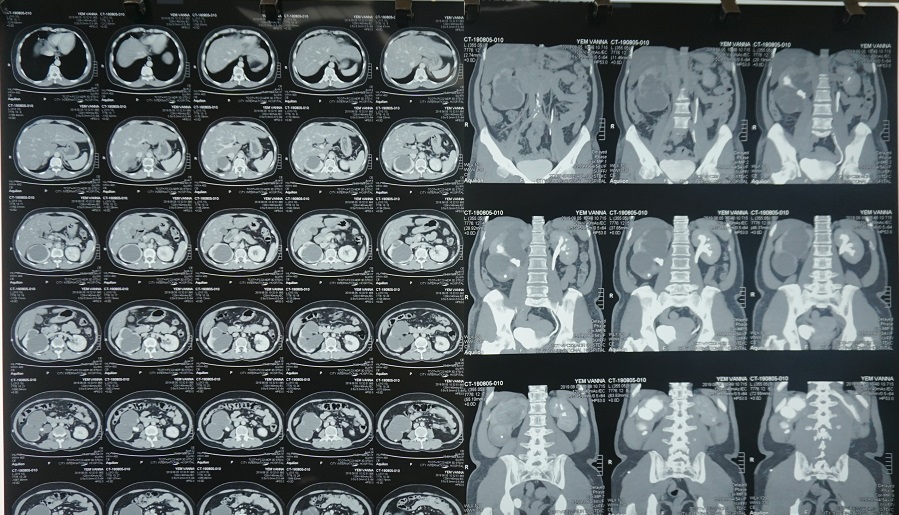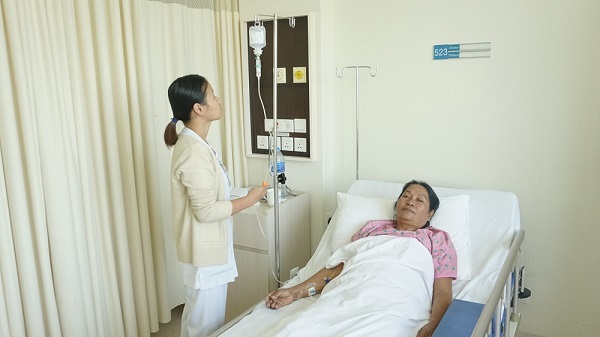When her hip discomfort worsened, a 54 years old female patient came from Cambodia to City International Hospital Vietnam seeking for curable treatment and got her renal function preserved instead of her previous kidney removal surgery appointment in Cambodia.
Through the City Plus program, on August 9, 2019, the female patient Y.V was admitted to City International Hospital in an extreme situation of Long-term hip pain. The pain gets worse after sitting for a long time, standing for a long, causing difficulty walking and living. Physical examination and diagnosis imaging revealed, Y.V patients have a history of type 2 diabetes, hypertension and kidney stones for many years. However, in the past 2 months, Y. Vanna went to seek help in Cambodia and her doctor determined the only way to relieve the intense pain patients like Y. Vanna experience is to remove the right kidney to remove the stones. The patient was too scared to make any decision, so the patient called City Plus Program hoping for another cure.

Patient Y.V's MR Imaging
A set of x-rays confirmed the diagnosis; the patient was diagnosed with third degree of water retained inside the kidney due to sinus internal kidney stones. After the consultation session, the City Plus medical council, including surgeons, made the decision for Endoscopic removal of kidney stones to preserve renal function. In this procedure, a small endoscopic instrument is passed through the skin (percutaneously) of the back into the kidney to remove the stone. This is a robotic technique, which means we are able to do this minimally invasive procedure through holes in the abdomen and not have to make a cut to do that. All of the advantages I just described (low ischemia time, maximally preserving the kidney and still being able to helps patients recover quickly) are all technological advancements to the robotic platform.
The patient was transferred to the operating room on the same day. During the procedure, the patient was punctuated to create a tunnel with instructions of ultrasound and a portable X-ray machine (C-arm), proceeding to place Amplatz Sheath 18F, scattering gravel with lasers; if the stone is empty, the renal pelvis and 1/3 of the ureter are not narrow, save JJ and open the kidneys to the skin. After surgery the patient is stable, completely improving the symptoms. The patient was withdrawn and urinated to open the skin for 2 days after surgery. On August 13, 2019, Patient vital signs assessment was good and stable, the urinary tract function was good, there was no pain, normal sleep at night, and the patient Y.V got discharged.

Patient Y.V one day before her hospital discharge
Journey of seeking treatment from Cambodia to Vietnam shared by the patient "I was happy that the surgery was successful. At first I was quite worried and panicked after my first diagnosis in Cambodia to remove the kidney. Coming to City International Hospital and being carefully examined and consulted, my kidney function got preserved."
Dr. Thi Thi My Van - Deputy Medical Director of City International Hospital shared “Stone disease is a very common urological disease. Kidney stones can cause the most unbearable pain, but sometimes kidney stones can exist silently without any symptom. Stone disease can cause urinary tract infection and can damage the kidney if not treated adequately. Common complications of kidney stones are renal colic due to stones stuck in the ureter, causing acute hydro nephrosis. Urinary tract infection caused by stones is an important complication that can be dangerous to life if not diagnosed and treated promptly. Renal stagnation due to stones obstructing prolonged urine flow causing failure of irreversible kidney function is also one of the common complications.
The cause of kidney stones is mostly linked to metabolic disorders. In addition, lack of exercise, a diet low in water, urinary habits, eating too much salt, abuse of calcium and some minerals are also one of the causes of kidney stones. Regular physical exams and abdominal ultrasound help to diagnose urinary tract stones early. Currently, there are many effective treatments for urinary tract stones depending on the location and size of the stones such as laser skin lithotripsy, lithotracheal ureteroscopy, laparoscopic laparoscopic surgery ... If detected Urinary tract stones without indications of intervention should be closely monitored at hospitals with specialized urology. See your doctor as soon as you experience pain in your hips, with or without pain, cloudy urine, and high fever.
A balanced diet, drinking enough water, exercising in a fit manner, not abusing minerals in nutrition and pharmaceuticals are ways to prevent effective urinary tract stones So understanding, prevention and care of stone disease is essential.
- Address: No.3, 17A street, Binh Tri Dong B Ward, Binh Tan Dictrict (Next to Aeon Mall Binh Tan,) HCM City.
- Phone: (028) 6280 3333 (ext. 8134 or 8162 for service consultation)
- Website: www.cih.com.vn/en/
- Facebook: https://www.facebook.com/BenhVienQuocTeCity










